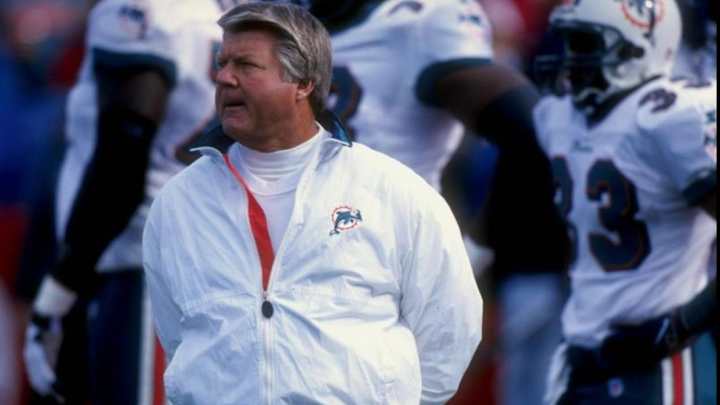Dolphins Rewind: The Legacy of Jimmy Johnson

Jimmy Johnson celebrated his 77th birthday today (July 16) and at some point (hopefully in the near future) he will be inducted into the Pro Football Hall of Fame after being elected this past January.
Johnson's election was based mostly on his work with the Dallas Cowboys, which he built into a two-time Super Bowl champion in the early 1990s, but his final four years in the NFL were spent as head coach of the Miami Dolphins.
After he was lured out of retirement to replace Don Shula, Johnson wasn't quite able to match that level of success in Miami, where he had won a national title in college football a little less than a decade earlier.
Because he followed Shula, a legend in Miami, and because he couldn't get fan favorite Dan Marino a Super Bowl title toward the end of his own Hall of Fame career, Johnson has taken some shots for his Dolphins tenure.
So let's evaluate the highs and lows of those four years.
No, Johnson wasn't able to deliver a Super Bowl to Miami and then-owner Wayne Huizenga, but the truth is Johnson had a successful tenure with the Dolphins in a lot of ways.
You can start with his won-loss record, which was 36-28 in four seasons. He never had a losing record in those four years and only in his first season with the Dolphins, when he spent the offseason trying to remedy a bad salary-cap situation, did the team miss the playoffs.
After going one-and-done in the 1997 playoffs, the Dolphins defeated the Buffalo Bills and Seattle Seahawks, respectively, in the first round the next two years before getting blown out by clearly superior teams — including the infamous 62-7 loss at Jacksonville in the final NFL game for both Johnson and Marino.
But the bottom line is that Johnson left the Dolphins in much better shape than when he arrived.
By the time Dave Wannstedt took over as head coach in 2000, Johnson had left him what could only be described as a championship-caliber defense.
There were stars at all levels of that defense, and it was Johnson who brought in pretty much every one of them.
He drafted Hall of Fame-worthy linebacker Zach Thomas in 1996, drafted Hall of Famer Jason Taylor and four-time Pro Bowl cornerback Sam Madison in 1997, drafted three-time Pro Bowl cornerback Patrick Surtain in 1998, brought in from Dallas via free agent three-time Pro Bowl safety Brock Marion.
Not everything was perfect, of course. There were draft mistakes, most notably trading down in the first round in 1998 to go from 19th to 29th to take draft bust John Avery before Randy Moss ended up going 21st.
Johnson also never was able to elevate the offense the way he did the defense. Of course, it didn't help that injuries had taken their toll on Marino by the time Johnson arrived. It also didn't help that Johnson was looking for more of a run-oriented offense than Marino had been accustomed to, which brought down the quarterback's numbers but also produced in 1996 the franchise's first 1,000-yard rusher (Karim Abdul-Jabbar) since 1978.
Maybe the worst thing Johnson did in Miami, though, was handpick his good friend Wannstedt to become his successor when he retired for a second time in January 2000 — he had been talked into coming back after wanting to retire after the 1998 season.
Wannstedt was a quality defensive coordinator for a long time — including under Johnson as head coach at Oklahoma State, UM and with the Cowboys — but he also was 40-56 during his six years as Chicago Bears head coach before he joined the Dolphins.
Wannstedt managed to guide the Dolphins to the playoffs his first two seasons, but that was mostly because of the defense that Johnson had assembled.
The Dolphins missed the playoffs in Wannstedt's third year, even with Ricky Williams leading the NFL in rushing with 1,853 yards, and again in 2003 despite finishing 10-6. The Dolphins started 1-8 in 2004, Wannstedt was fired, and the Dolphins have been to the playoffs twice since then.
So clearly Johnson didn't recommend the right man for the job because he had set the team up for success and Wannstedt wasn't able to sustain it.
So how you choose to remember Johnson may depend which factor you consider more important.
But there is no denying the positives.

Alain Poupart is the publisher/editor of Miami Dolphins On SI and host of the All Dolphins Podcast. Alain has covered the Miami Dolphins on a full-time basis since 1989 for various publications and media outlets, including Dolphin Digest, The Associated Press and the Dolphins team website. In addition to being a credentialed member of the Miami Dolphins press corps, Alain has covered three Super Bowls (for NFL.com, Football News and the Montreal Gazette), the annual NFL draft, the Senior Bowl, and the NFL Scouting Combine. During his almost 40 years in journalism, which began at the now-defunct Miami News, Alain has covered practically every sport at one time or another, from tennis to golf, baseball, basketball and everything in between. The career also included time as a copy editor, including work on several books, such as "Still Perfect," an inside look at the Miami Dolphins' 1972 perfect season. A native of Montreal, Canada, whose first language is French, Alain grew up a huge hockey fan but soon developed a love for all sports, including NFL football. He has lived in South Florida since the 1980s.
Follow @PoupartNFL